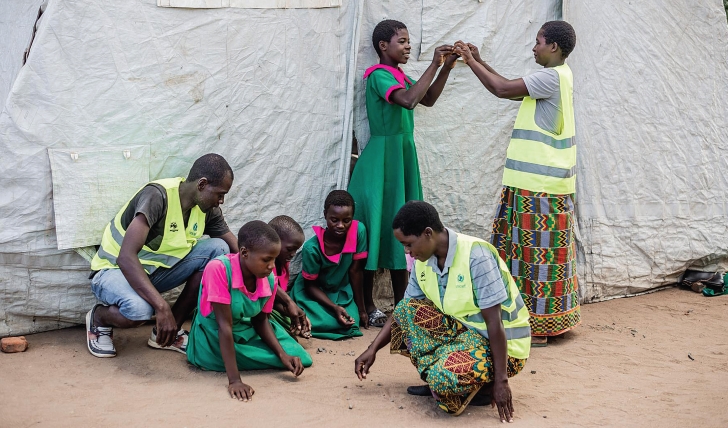Making camps safe for all
At Jombo Primary School in Chikwawa District, a suggestion box welcoming the deepest fears of people displaced by Cyclone Freddy sits in the sunlight.
Since the storm destroyed homes in the Southern Region in March year, the box has been filled with grievances about dwindling food aid amid escalating hunger.

Ironically, some men have been caught selling their families’ food rations for liquor.
“In April, our community policing forum expelled two men from the camp for such acts of neglect, torture and gender-based violence [GBV],” says the policing forum’s chairperson Francis Masamba. “This was occurring while women were labouring under the sun, picking seasonal vegetables and fruits to feed their hungry children.”
One of the affected women was stunned upon discovering the disappearance of maize and blankets her family had received from humanitarian organisations.
“The man had been neglecting my needs and our three children even before the floods destroyed our homes and forced us into this camp,” she confesses.
The GBV survivor praises the community policing forum for protecting the rights and well-being of women and children, especially those at risk of starvation, malnutrition and rights violations.
Jombo Camp houses 3 115 people, including 1 442 children aged below 18. Over 450 families have since returned home, paving the way for schooling and reconstruction to resume.
Masamba explains: “Our forum was established in 2014 and has 42 members. It exists to protect women and children from all forms of violence, including child marriages and sexual exploitation.
“Most cases at the camp, however, involve property thieves who neglect their families and sell relief items for personal gain.”
When the rainstorms struck, the forum members conducted search and rescue operations, ensuring no one was left behind.
These operations primarily benefitted children, women, the sick, persons with disabilities, and the elderly.
They now assist the police, camp leaders and child protection workers in maintaining law and order.
Unicef, with funds from the United Nations Central Emergency Response Fund and the European Civil Protection and Humanitarian Aid Operations, supports the Malawi Police Service to boost social protection interventions in emergency evacuation centres.
Jombo is among the selected camps in Chikwawa where community policing groups received three whistles, three torches and reflective bibs for each member.
“We patrol the camp day and night to protect lives, property and rights. If we hear a child crying or someone threatening them, we swiftly intervene to get to the root of the problem,” Masamba assures.
Sub-inspector Fortune Salisbury, who coordinates community policing at Nchalo Police Station, notes the importance of these groups in maintaining law and order.
“Security and social protection systems collapse and rights abuses increase when disasters strike. Most people only focus on their survival, neglecting the well-being of vulnerable groups,” he states.
Jombo camp leader Godfrey Khuleya hails the community policing group for addressing rights violations and exploitation, which often increase during humanitarian emergencies. “These volunteers are our eyes and ears in ensuring no one is excluded, short-changed or exploited,” he says.
Chisomo Christopher, one of the 846 girls under the age of 18 at the camp, now lives without fear.
She narrates: “I was frightened when we first arrived after our house in Ngoza Village was destroyed by the floods.
“Living with so many strangers was unfamiliar and intimidating. Now, thanks to the police forum, I live peacefully. My only worry is going to school hungry.”





